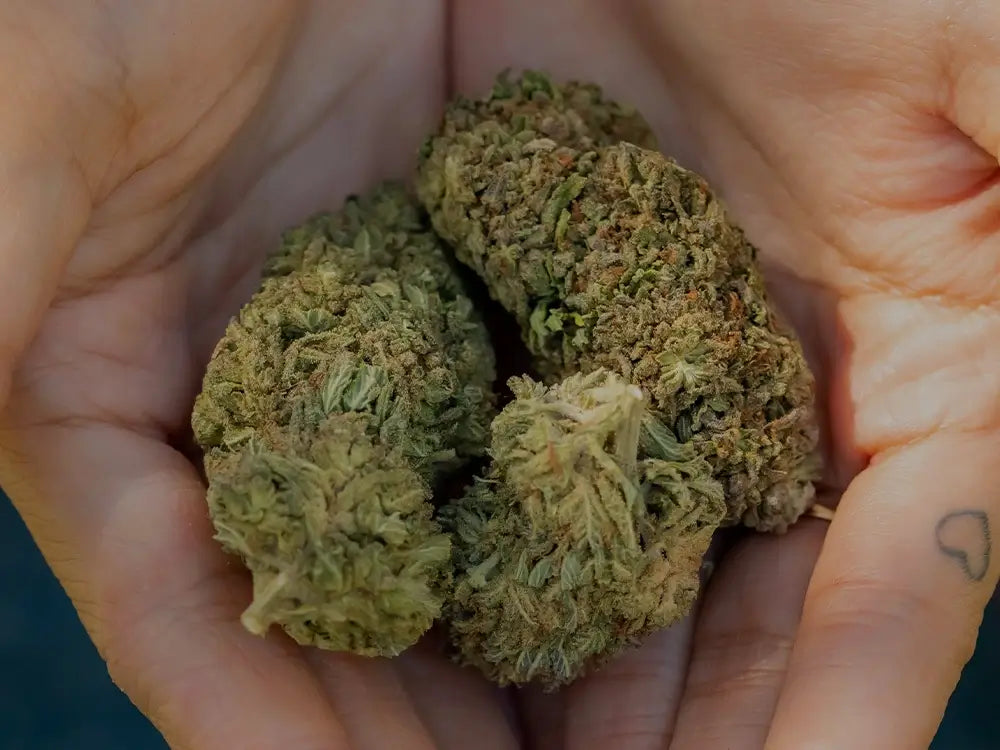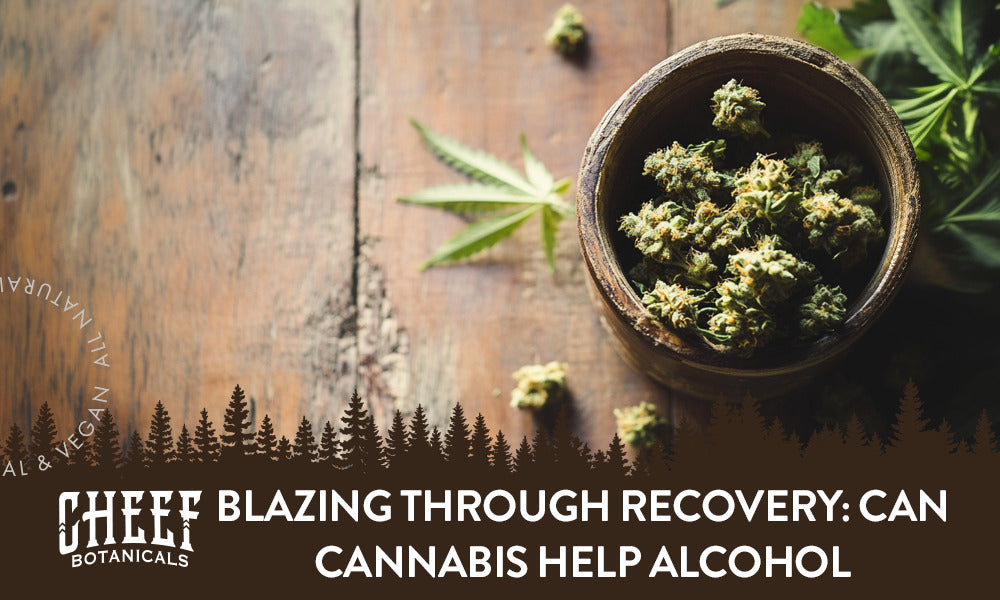Alcohol withdrawal can be tough and even risky for heavy drinkers. Symptoms can range from trembling hands to more serious problems like seizures. With traditional methods not always meeting everyone's needs, some people are exploring alternatives to deal with the effects of quitting drinking. But can cannabis help alcohol withdrawal, or is it just another passing idea in the wellness world?
The answer lies in understanding how cannabis interacts with the body during this delicate process. In this guide, we'll talk about using cannabis as a possible substitute for alcohol during withdrawal. We'll cover the potential benefits, the risks, and what experts say about this idea. If you're curious about how cannabis fits into recovery, keep reading to find out more.
Understanding Alcohol Withdrawal
For many people, alcohol becomes a regular part of life, whether as a way to unwind, socialize, or cope with challenges. But when heavy drinking becomes a habit, stepping away from it isn't as simple as it sounds. Alcohol withdrawal begins when someone decides to cut back or quit, and the body starts reacting to the absence of something it has grown used to.
This process is about more than just willpower—it's a physical and mental adjustment. Understanding what happens during withdrawal is the first step in learning how to handle it and explore healthier ways forward.
What Causes Alcohol Withdrawal?
Alcohol withdrawal happens because of how alcohol affects the brain and body over time. The brain adapts to regular heavy drinking by changing the way it controls important chemicals such as GABA and glutamate. GABA helps calm the brain, while glutamate keeps things active, and alcohol disrupts their balance.
When alcohol intake suddenly stops, the brain struggles to adjust without it, causing a surge in activity. This rapid change is what leads to withdrawal and makes the process so difficult for people trying to quit drinking.
Common Symptoms of Alcohol Withdrawal
When someone quits drinking after prolonged or heavy alcohol consumption, the body reacts to the sudden change. Alcohol disrupts the balance of brain chemicals, and when it's no longer present, the body works overtime to restore equilibrium. This adjustment leads to alcohol withdrawal symptoms, which can vary depending on the individual and their level of alcohol use. Some common symptoms include:
- Irritability
- Shakiness
- Restlessness
- Fatigue
- Difficulty concentrating
- Trouble sleeping
- Sweating
For some, symptoms might stop there, but in rare cases, more severe reactions occur. Delirium tremens (DTs) can bring on fever, seizures, confusion, or hallucinations, which require immediate medical attention. Catching these symptoms early makes it easier to handle withdrawal safely and effectively.

Can Cannabis Help Alcohol Withdrawal?
Many people are exploring cannabis as a potential tool for managing alcohol withdrawal, and early findings suggest some promising possibilities. By interacting with the body's endocannabinoid system (ECS), cannabis may help make the transition smoother during withdrawal, especially for issues like restlessness and agitation. This natural approach could provide a sense of calm and stability when it's needed most.
Cannabis might also help with alcohol cravings, giving a sense of relief without turning back to drinking. For those who struggle with going cold turkey, using cannabis responsibly could be a more flexible option. While more research is needed, many are hopeful about cannabis' potential to support recovery from alcohol dependence.
Potential Benefits of Cannabis During Withdrawal
Cannabis may offer helpful support for people going through alcohol withdrawal. Some believe it can make the process smoother by easing the transition away from alcohol. This can be especially useful for those who prefer a flexible approach over traditional methods or group programs.
Cannabis is also thought to benefit mental health during alcohol abstinence as it may promote a positive mood and ease stress. Compared to alcohol, cannabis is also seen as having a lower risk of overdose and fewer interactions with other drugs. Some benefits of consuming cannabis during alcohol withdrawal may include:
- May help regulate mood during recovery.
- Might reduce alcohol cravings.
- Supports a healthy appetite.
- Eases stress.
- Offers a safer alternative to heavy alcohol use.
- Potential option for those not ready for total abstinence.
How Cannabis Interacts with the Body During Alcohol Detox
Cannabis affects the body by connecting with the endocannabinoid system, which helps control appetite, mood, sleep, and stress levels. When alcohol detox begins, the body's natural balance is thrown off, often leading to restlessness, trouble sleeping, and heightened emotions. Consuming cannabis during this time may help the body adjust by influencing these receptors to promote a sense of calm and stability.
Cannabinoids like THC and CBD connect to specific receptors in the brain and other parts of the body. This interaction may help regulate processes that become unbalanced during alcohol withdrawal, such as mood swings and appetite loss. Additionally, cannabis may help reduce cravings by activating the reward centers in the brain, which could make quitting alcohol feel more manageable.
By working with the body's natural systems, cannabis might offer a smoother detox experience for some people. More research is needed, but these interactions show how cannabis could possibly play a role in recovery.
Provides a Mild Buzz in Place of Getting Drunk
For those trying to quit drinking, cannabis can provide a mild, blissful sensation without the overpowering effects of alcohol. Unlike alcohol, which can impair decision-making and coordination, consuming cannabis offers a calmer and more manageable experience. This makes it a popular choice for those looking to relax or socialize without the risks that come with heavy drinking.
Using cannabis responsibly may also help reduce the urge to drink by fulfilling the desire for a buzz in a safer way. It can serve as an alternative for people transitioning away from alcohol, offering a crutch during recovery. If you're addicted to the action of sipping alcohol, puffing cannabis might feel like a suitable replacement.
Key Cannabinoids for Alcohol Withdrawal Support
Cannabinoids are natural compounds in cannabis that work with the body's endocannabinoid system to support things like mood, sleep, and appetite. Each cannabinoid is unique, offering different effects that could help with alcohol withdrawal. Here's a breakdown of their differences and how they can help.
- CBD (Cannabidiol). CBD doesn't cause a euphoric feeling but may help calm restlessness, support sleep, and ease stress during withdrawal.
- THC (Tetrahydrocannabinol). THC can create a euphoric effect in small doses. It might help with relaxation and possibly reduce alcohol cravings, but it needs to be used responsibly.
- CBG (Cannabigerol). Known as the "foundation" of other cannabinoids, CBG may boost appetite and help balance mood, which is helpful when energy and nutrition are low.
- CBN (Cannabinol). CBN is soothing and works well for sleep support, making it a good option for managing nighttime discomfort.
Each cannabinoid offers unique benefits, giving people in recovery options to address different challenges they face during alcohol detox.
The Role of CBD in Easing Anxiousness and Discomfort
CBD has a unique structure that works differently from THC. Instead of directly attaching to receptors in the brain, CBD influences how the body's endocannabinoid system regulates mood and discomfort. This makes it helpful for people dealing with anxious feelings and physical tension during alcohol abuse recovery. Since it doesn't cause a "high" effect, CBD is a safer option for those who need relief while staying clear-headed and focused.
THC's Potential for Supporting Relaxation and Sleep
THC directly connects to receptors in the brain, which creates its comforting and sedative effects. Its chemical structure helps regulate processes like stress and rest, making it useful for people struggling with sleep issues during alcohol withdrawal. By promoting relaxation, THC may help ease tension and the overwhelming feelings that come with recovery. However, because it can be intoxicating, it's important to use it carefully and in moderation.
Comparing Cannabis with Traditional Alcohol Withdrawal Treatments
Traditional treatments for alcohol withdrawal syndrome often include medications, therapy, and support groups. Doctors commonly prescribe benzodiazepines to ease withdrawal symptoms like restlessness or tremors. Counseling and programs focus on helping people address emotional struggles and build healthier habits. While effective, these methods can feel formal or overwhelming for some.
Cannabis offers a different option for managing alcohol addiction. Compounds like CBD and THC work with the body to help reduce physical discomfort, support mood, and promote quality rest. Unlike medications that require strict medical oversight, cannabis may feel more flexible and natural for some individuals. Both approaches have their strengths, but cannabis provides an alternative for those looking for a less edgy path to recovery.
Pros and Cons of Using Cannabis for Withdrawal Support
Cannabis can be an option for people managing alcohol withdrawal, but it's important to understand both the positives and potential challenges. For some, it offers a natural and approachable alternative, but it's not without risks, especially for those with a history of drug abuse.
Pros:
- Reduces cravings naturally. Cannabis may help reduce alcohol cravings by interacting with the body's endocannabinoid system, providing relief in a natural way.
- Supports relaxation and sleep. It may promote sleep, relaxation, and a sense of calm during withdrawal, which many traditional treatments may not fully address.
- Offers a flexible approach. For those who find structured programs intimidating, cannabis offers a natural approach that, to some, feels less restrictive.
- Eases discomfort. Natural compounds like CBD and THC may help balance mood and ease physical discomfort during recovery.
Cons:
- Risk of overuse. If used irresponsibly, there's a chance of developing cannabis use disorder, which could create new challenges during recovery.
- Possible impact on responsibilities. THC's intoxicating effects might affect daily responsibilities, making it important to use it responsibly. Starting with a low dose, such as 2.5 to 5 milligrams, and choosing milder products with balanced THC-to-CBD ratios can help.
- Limited research is available. Research on the long-term effects of cannabis for withdrawal support is still limited, leaving some questions unanswered.
Reflecting on these details can help you make an informed choice about using cannabis during your recovery journey.
How Might Cannabis Complement Other Treatments?
Cannabis consumption may be a helpful addition to traditional alcohol withdrawal treatments. It could possibly ease symptoms like restlessness and poor sleep, making it easier for people to focus on counseling, support groups, and recovery. Cannabinoids may also help balance emotions, which supports mental health during recovery. Consuming cannabis alongside other treatments gives people more options to manage the challenges of alcohol addiction.
Safe Ways to Use Cannabis for Alcohol Withdrawal
Using cannabis for alcohol withdrawal requires thoughtful and responsible choices. While it offers potential benefits, it's essential to approach it carefully to avoid new challenges like overuse or cannabis use disorder. By focusing on proper dosage and methods of consumption, individuals can explore how cannabis might support their recovery journey safely and effectively.
Finding the Right Dosage
Determining the right dosage of cannabis is key to using it safely for alcohol withdrawal. Starting with a low dose, such as 2.5 to 5 milligrams of THC, allows your body to adjust without overwhelming effects. CBD, being non-intoxicating, can often be taken in larger doses for calming benefits without any risk of feeling "high."
It's also important to listen to your body and gradually adjust the dosage if needed. Seeking advice from a doctor first ensures you get the right guidance for a successful recovery journey.
Methods of Consumption
The method you choose for cannabis consumption matters just as much as the dosage you take. Each method affects the body differently, so it's important to select one that fits your comfort level and needs. By choosing the right method and starting with small amounts, cannabis can complement recovery in a way that feels safe and manageable. Popular methods of consumption include:
- Edibles. These provide long-lasting effects, but the onset is slower, taking 30 minutes to 2 hours. Take a minimal dose first and allow time to gauge its effects before adding more.
- Tinctures. Taken under the tongue, tinctures offer fast absorption and precise dosing, making them ideal for controlled use.
- Vaping. This method delivers quick effects, but it's important to use it responsibly to avoid overconsumption.
- Topicals. Non-intoxicating creams or balms can ease physical discomfort without entering the bloodstream.
Where to Get the Best Legal Cannabis Goods
Finding the right cannabis products can make all the difference, especially during alcohol withdrawal. Trusted online brands like ours offer many options like gummies, concentrates, and other THC or CBD products. If you like in a cannabis-friendly state, you can also explore local dispensaries with a strong reputation for quality and safety.
Choosing Reliable and Safe Sources
It's important to buy cannabis from sources you can trust. Cheef Botanicals is a reliable option, offering products that are third-party lab-tested and come with Certificates of Analysis (COA). This ensures you're getting safe and accurate products with no hidden surprises. Whether you shop locally or online, stick to sellers, like us, that focus on quality and transparency to avoid harmful ingredients or mislabeled goods.
Tips for Identifying Quality Cannabis Products
Choosing high-quality cannabis products doesn't have to be complicated if you know what to look for. Start by checking labels and certifications to ensure the product meets safety and legal standards. Here are some tips to find the best options:
- Look for lab testing. Only buy products that are third-party lab-tested with a COA available for review.
- Check for clear labeling. The product should list its THC, CBD, or other cannabinoid content accurately.
- Avoid harmful additives. Choose cannabis products that use clean, natural ingredients and skip anything with synthetic fillers.
- Read reviews. Look for positive feedback from other consumers to confirm the product's quality and effectiveness.
Why Choose Cheef Botanicals for Cannabis Options?
Cheef Botanicals is a trusted brand offering high-quality cannabis products that are safe, effective, and easy to enjoy. Whether you're looking for tasty, convenient options or products you can trust, we've got you covered.
- Options and Variety. Our CBD and THC gummies come in a range of flavors and strengths to match your preferences. We also offer a wide selection of THCa and CBD flower along with super-potent concentrates. And if vapes are your thing we have the best flavors in both disposables and cartridges. check out our shop to see what fits your vibe.
- Our Commitment to High-Quality Natural Ingredients. All our products are made with natural, vegan-friendly ingredients and are free of artificial additives. This ensures you get a clean, high-quality experience every time.
- Lab-Tested Products for Safety and Potency. Every product is third-party lab tested to guarantee safety and accurate potency. With Certificates of Analysis (COA) available, you can trust that you're getting exactly what's promised on the label.

Frequently Asked Questions About Cannabis and Alcohol Withdrawal
Is Cannabis Safe to Use During Alcohol Detox?
CBD is generally considered safe during alcohol detox and may help with calming and discomfort without causing intoxication. THC, on the other hand, can have stronger effects and may cause impairment if not used carefully. It's always best to start with low doses of THC and consult a doctor if you're unsure about its impact during detox.
Can Cannabis Be Combined with Medications for Withdrawal?
Using cannabis with medications for alcohol withdrawal should only be done with medical guidance. Some medications can interact with cannabis and change how they work. To be safe, talk to your doctor before combining cannabis with any prescriptions.



 CBD Gummies - Top Seller
CBD Gummies - Top Seller
 CBD + THC Gummy - Excellent Choice
CBD + THC Gummy - Excellent Choice
 CBD Hemp Flower - Highly Rated
CBD Hemp Flower - Highly Rated
 Full Spectrum CBD Oil - Good Value
Full Spectrum CBD Oil - Good Value



Leave a comment
This site is protected by hCaptcha and the hCaptcha Privacy Policy and Terms of Service apply.